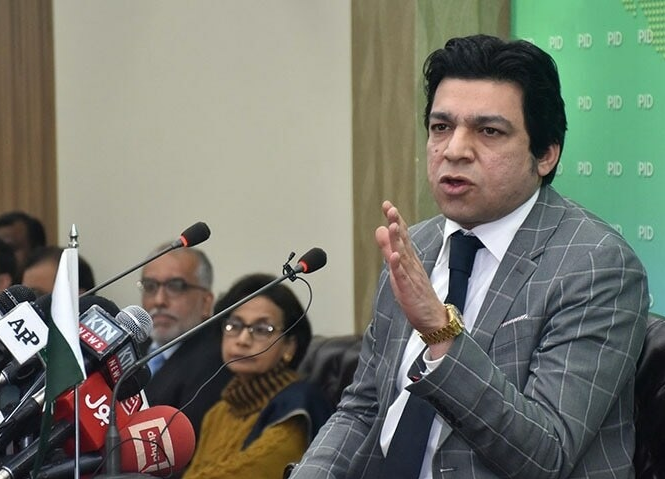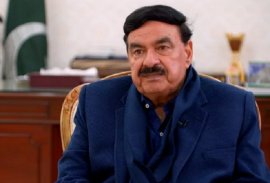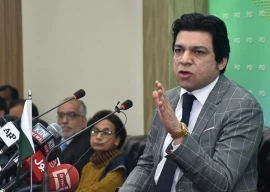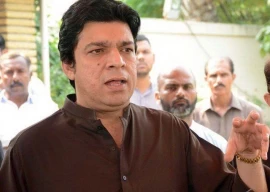
The Islamabad High Court (IHC) has dismissed former federal minister Faisal Vawda’s plea seeking the revocation of his lifetime disqualification handed to him by the Election Commission of Pakistan (ECP).
The IHC observed that the ECP disqualified Vawda after concluding that he had submitted a false affidavit regarding his nationality to the commission at the time of the filing of his nomination papers to contest elections from Karachi's NA-249 constituency in 2018.
Last week, the electoral watchdog disqualified PTI leader Faisal Vawda for life from parliament for submitting a false affidavit regarding his dual citizenship.
The PTI senator was disqualified by the election watchdog for violating Article 62(1)(f) which pertains to being "sadiq (truthful) and "amin" (honest). The article provision sets the precondition for a member of parliament and is the same provision under which former prime minister Nawaz Sharif was disqualified by Supreme Court on July 28, 2017, in the Panama Papers case.
Read more: IHC reserves judgment on Vawda's petition against lifelong disqualification
The PTI subsequently filed an appeal with the high court, challenging the ECP's decision on the grounds that the ECP lacked constitutional mandate.
"The probe conducted by the Commission and the Petitioner’s own conduct established that he had filed a false affidavit pursuant to the judgment of the august Supreme Court in the case of Habib Akram," says 12-page judgment authored by IHC Chief Justice Athar Minallah while rejecting the petition on Wednesday.
The apex court, in the Habib Akram case, had ruled: “If any false statement is made therein, it would also entail such penalty as is of filing a false affidavit before this [Supreme] Court.”
The IHC said that the case in hand was of a peculiar nature. "The fact that on the date the affidavit was submitted along with the nomination papers, the process of renunciation of the petitioner’s foreign citizenship was not concluded nor completed stands established, rather, candidly conceded," the IHC order read, adding that a declaration regarding the consequences of such an occurrence had been made by the Supreme Court in a previous case.
The order stated: "If the affidavit or any part thereof is found false, then it shall have consequences, as contemplated by the Constitution and the law. Since the Affidavit is required to be filed in pursuance of the orders of this [Supreme] Court, therefore, if any false statement is made therein, it would also entail such penalty as is of filing a false affidavit before this [Supreme] Court.”
The IHC observed that Vawda's election had also been challenged previously on the same grounds (false affidavit) through a writ petition filed in the same court but he kept delaying proceedings and eventually, after a year, said he had resigned from the National Assembly and thus the court disposed of the petition for being "infructuous".
Read: Pandora Papers probe should start with me, says Faisal Vawda
"However, the matter of furnishing [a] false affidavit is to be probed by the Election Commission of Pakistan since the same was submitted before it and the commission may pass appropriate orders with respect to the same.”
This order was not challenged by Vawda, the court said, adding that "it appears from the record that instead of establishing his bonafides by producing a certificate of renunciation of [his] citizenship, proceedings were delayed by the petitioner before the commission."
The IHC observed that "it is indeed a settled law that when a citizen of Pakistan has acquired the citizenship of a foreign state, the latter shall not be qualified to be elected or chosen or being a member of the Majlis-i-Shoora (parliament) until and unless such legal status i.e. being a citizen of a foreign state was obliterated or extinguished."
"Mere initiation of the process of relinquishment was not sufficient because disqualification would remain operative till the completion and conclusion of the process. The critical date for being qualified to be a member of the Majlis-i-Shoora (parliament) was the date when the nomination papers were filed," the order read. "As a corollary, the process of relinquishment of the foreign nationality should have been completed and concluded before submission of the nomination papers."
The IHC concluded that "it is obvious from the record and the events described in the impugned order, dated 09-02-2022, that the conduct of the petitioner remained contumacious over a long period of time."
"He kept delaying the proceedings before this court as well as the commission. He refused to submit a renunciation certificate issued by a competent authority of the foreign State."
"For what has been discussed above, the court has not been able to persuade itself that the impugned order, dated 09-02-2022, suffers from any legal infirmity requiring interference. The petition is, therefore, accordingly dismissed," the order read.
The court also stated in its judgement that "it is not a pleasant duty to be called upon or to refuse to examine and exercise powers of judicial review, which may lead to an elected representative being disqualified as a member of the Majlis-e-Shoora (parliament)," and that while exercising or refusing to exercise judicial review, the courts claim no supremacy over organs that represent the people of Pakistan.
"The Commission was bound to give effect to the said declarations and the ensuing consequences. That is what it has done. The Petitioner’s conduct has led to the disqualification of an elected representative and, regrettably, he alone is responsible for the consequences", says the order.


1731735822-0/Copy-of-Untitled-(1)1731735822-0-165x106.webp)






1731740253-0/BeFunk_§_]_-(21)1731740253-0.jpg)



1644392386-0/4398794271644388182-(1)1644392386-0-270x192.webp)






COMMENTS (1)
Comments are moderated and generally will be posted if they are on-topic and not abusive.
For more information, please see our Comments FAQ